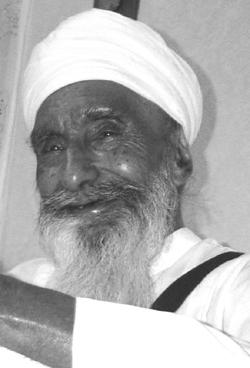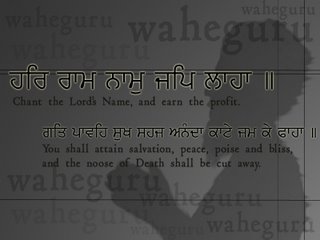Thursday, May 25, 2006
Does EVIL exist?
Wednesday, May 24, 2006
Killing the Five Evils: Overcoming Anger (Krodh)
sloku ]salok
Salok:
kwm k®oD Aru loB moh ibnis jwie AhMmyv ]kaam krodhh ar lobh moh binas jaae aha(n)maevSexual desire, anger, greed and emotional attachment - may these be gone, and egotism as well.
nwnk pRB srxwgqI kir pRswdu gurdyv ]1]naanak prabh saranaagathee kar prasaadh guradhaev 1Nanak seeks the Sanctuary of God; please bless me with Your Grace, O Divine Guru. 1

Anger
Satguru Sri Guru Tegh Bahadhur Ji Maharaj, the king of kings, the saint of saints and the blanket of the world said to his sikhs, 'In anger man commits evil deeds. He loses at once his senses, and his religion. When anger springs up in a man's heart, what crime is there he will not perpetrate?'
He thinks nothing of sinning against his parents and his holy Guru. He takes the life which he ought to protect, and utters nothing but harsh language. He will not refrain from any act even though he sacrifices his life in its execution. There is no greater sacrifice than life, and yet the foolish person will deliberately make it. The angry man's soul burns if he does not obtain his desires. He cannot eat or sleep. Day and night he is tortured by his passion, and forms endless plans for its gratification. In this way he passes his time in misery.
Forgiveness
'To exercise forgiveness is a great act. To exercise forgiveness is to give alms. Forgiveness is equal to ablutions at all places of pilgrimage. Forgiveness ensures man's salvation. There is no virtue equal to forgiveness.'
'Whenever you get the chance generously exercise it. Never abandon this virtue, but ever preserve it in your hearts. You are ordered in the Granth Sahib (Guru Granth Sahib Ji Maharaj) to lay up the wealth of the Name, so that it may accompany you in this world and in the next.'
'This wealth is only found in the companionship of good men, and cannot be obtained by any other means. My followers possess this wealth which is superior to all jewels and gems. The saints hoard it day and night.'
'It cannot be purchased, no thief can steal, no fire consume, no water drown it, whereas worldly wealth is generally accumulated by sin. Thieves can steal it, pickpockets purloin it, kings seize it, fire burn it, and earth rot it. At the hour of death this sinful wealth only causes regret, and, through man's desires being fixed on it his soul falls into terrible hell.'
I will post a sakhi relating to this next time.
Waheguru Ji Ka Khalsa Waheguru Ji Ki Fateh
Monday, May 22, 2006
Killing the Five Evils: Overcoming Attachment (Moh)
sloku ]
salok
Salok:
kwm k®oD Aru loB moh ibnis jwie AhMmyv ]
kaam krodhh ar lobh moh binas jaae aha(n)maev
Sexual desire, anger, greed and emotional attachment - may these be gone, and egotism as well.
nwnk pRB srxwgqI kir pRswdu gurdyv ]1]
naanak prabh saranaagathee kar prasaadh guradhaev 1
Nanak seeks the Sanctuary of God; please bless me with Your Grace, O Divine Guru. 1

A Sikh once came into the darbar of Satguru Sri Guru Gobind Singh Ji Maharaj asked this question, "O True Emperor, holy men have risen above worldly attachment. By what thought are they aided? Attachment is a very chronic ailment of mankind. By what method have they risen above this? Please, be kind and explain it to us."
"I will tell you the way the saints have conquered attachment to the world. They regard the material possessions as a dream. Just as what you see in a dream, does not exist when you wake up, in the same way saints have woken up to the real knowledge (gyan). All objects of the world appear to be transient to them," explained Maharaj.
Satguru Sri Guru Gobind Singh Ji then began to tell a story, "There was a saint, who had attained a high spiritual stage. Living in the midst of the world, he remained above its pleasures and sorrows. Someone came and informed him that his son had died. The saint did not express any grief at the news. The people talked about the son thus, 'Sant ji, your son was very handsome and young. He was also very learned. At his death all others expressed their shock. But you have not mourned his death. What considerations have influenced your mind?'
"During the night I saw a dream in which I was a king. I married and got a son. But when I woke up, there was neither kingdom, nor wife and son. On waking from this dream, I heard the news that my son of the world of consciousness had died. Then I went to my Gurdev and told him of my miserable plight. 'Swami ji,' I said, 'not only has my dream world disappeared, but my real son also is no more. What should I do now? I am overwhelmed with grief.'
"Give up mourning over both, for the whole universe is an illusion, the dream world and the conscious world. What is an illusion, does not deserve mourning over. Illusion means that in fact nothing was created, or exists. Uncreated objects enter our vision, in dreams or in the conscious world. Therefore, stop mourning over both,' explained my Gumdev to me, and the reality clearly dawned in my mind. For this reason, I am not affected by sorrows or pleasures of the world.' This is the way saints have risen above worldly attachments," concluded the Satguru Sri Guru Gobind Singh Ji Maharaj, the king of kings and the saint of saints.
sloku ]
salok
Salok:
kwm k®oD Aru loB moh ibnis jwie AhMmyv ]
kaam krodhh ar lobh moh binas jaae aha(n)maev
Sexual desire, anger, greed and emotional attachment - may these be gone, and egotism as well.
nwnk pRB srxwgqI kir pRswdu gurdyv ]1]
naanak prabh saranaagathee kar prasaadh guradhaev 1
Nanak seeks the Sanctuary of God; please bless me with Your Grace, O Divine Guru. 1
Waheguru Ji Ka Khalsa Waheguru Ji Ki Fateh
Monday, May 15, 2006
An Amazing Post
I encourage you all to read this post by Shinda Veerji on the jeevan of Sri Maan Sant Baba Thakur Singh Ji Khalsa. It's one of the most amazing posts I have ever read.

Dhan Dhan Sri Maan Sant Baba Thakur Singh Ji Khalsa
Waheguru Ji Ka Khalsa Waheguru Ji Ki Fateh
Thursday, May 11, 2006
The power of King Janak
Bgq vfw rwjw jnk hY gurmuK mwXw ivc audwsI]
bhagath vaddaa raajaa janak hai guramukh maayaa vich oudhaasee
King Janak was a great saint who amidst maya remained indifferent to it.
dyv lok noN cilAw gx gMDrb sBw suKvwsI]
dhaev lok no(n) chaliaa gan ga(n)dhharab sabhaa sukhavaasee
Along with gans and gandharvs (calestial musicians) he went to the abode of the gods.
jmpur gieAw pukwr sux ivllwvn jI nrk invwsI]
jamapur gaeiaa pukaar sun vilalaavan jee narak nivaasee
From there, he, hearing the cries of inhabitants of hell, went to them.
Drmrwie no AwiKEnu sBnw dI kr bMd KlwsI]
dhharamaraae no aakhioun sabhanaa dhee kar ba(n)dh khalaasee
He asked the god of death, Dharamrai, to relieve all their suffering.
kry bynqI Drmrwie hau syvk Twkur AibnwsI]
karae baenathee dhharamaraae ho saevak t(h)aakur abinaasee
Hearing this, the god of death told him he was a mere servant of the eternal Lord (and without His orders he could not liberate them).
gihxy DirAnu iek nwauN pwpW nwl krY inrjwsI]
gehinae dhharian eik naaou(n) paapaa(n) naal karai nirajaasee
Janak offered a part of his devotion and remembrance of the name of the Lord.
pwsMg pwp n pujnI gurmuK nwauN Aqul n qulwsI]
paasa(n)g paap n pujanee guramukh naaou(n) athul n thulaasee
All the sins of hell were found not equal even to the counterweight of balance.
nrkhuM Cuty jIAw jMq ktI glhu islk jmPwsI]
narakahu(n) shhuttae jeeaa ja(n)th kattee galahu silak jamafaasee
In fact no balance can weigh the fruits of recitation and remembrance of the Lords name by the gurmukh.
mukiq jugiq nwvYN kI dwsI ]õ]
mukath jugath naavai(n) kee dhaasee a
All the creatures got liberated from hell and the noose of death was cut. Liberation and the technique of attaining it are the servants of the name of the Lord.

Hearing their words, the very righteous king became filled with pity and thought to himself, "If due to the touch of the breezes that have touched my body I am bringing some happiness to the residents here, then I will stay in this place. This is heaven for me."
Thinking like this, the king stayed there by the gateway to hell. After some time, Dharam Raj himself, who inflicts severe torment upon sinners, came to that gateway. There he saw King Janak, full of mercy and a doer of great meritorious deeds, standing by the doorway.
Dharam Raj smiled and said to King Janaka, "O king! You are sarva-dharma-siromani - the crest jewel of piety. Why have you come here? This is a place for wicked sinners who cause harm to others. Men like you who perform meritorious deeds do not come to this place. Only those persons who deceive others, who are engaged in criticizing others, and who are intent on stealing others' wealth come here. One who, out of greed for wealth, deceives his friend, comes here and receives intense punishment from me."
Dharam Raj then said, "Those persons who do not remember the Lord with their mind, words, or deeds I throw into hell and have boiled. Those who have remembered the Lord leave the sufferings of hell and quickly go to Heaven.
"O very intelligent king, my servants, unable to even look at persons like you, bring those who are great sinners. Therefore you should leave this place and go enjoy many pleasures. Enter the excellent chariot and go reap the fruits of the religious merits you have earned."
 Hearing the words of Dharamraj, with great compassion King Janaka replied, "O Dharam Raj, out of pity on these beings I shall not go to Heaven. Although situated in this place, they are feeling some comfort due to the breezes blowing past my body. If you release all of these persons living in hell then I shall be happy and will proceed to Heaven."
Hearing the words of Dharamraj, with great compassion King Janaka replied, "O Dharam Raj, out of pity on these beings I shall not go to Heaven. Although situated in this place, they are feeling some comfort due to the breezes blowing past my body. If you release all of these persons living in hell then I shall be happy and will proceed to Heaven."Hearing the words of King Janaka, Dharam Raj pointed out to him each of those living in hell and said told the king why they were in hell and the punishment each one of them was going to receive.
After making all of these persons eat the fruit of their sins, I shall release them. O best among men who have accumulated vast amounts of religious merit, please leave this place.
 Having pointed out the sinful persons, Dharam Raj became quiet. With his eyes full of tears, King Janaka, the great devotee of the Lord, said, "Tell me, how can these miserable beings quickly be set free from hell and attain happiness?"
Having pointed out the sinful persons, Dharam Raj became quiet. With his eyes full of tears, King Janaka, the great devotee of the Lord, said, "Tell me, how can these miserable beings quickly be set free from hell and attain happiness?"Dharam Raj replied, "These persons have never worshiped the Lord. How then can they be free from hell? O great king, if you desire to release them, even though they are great sinners, then give them the following religious merit possessed by you: Once, upon getting up in the morning, you meditated with a pure heart upon the Lord— the remover of great sins. Give them the religious merit which you obtained that morning when with a pure heart you uttered, "Rama, Rama." Obtaining that merit, they will get freedom from hell."
Hearing these words of the intelligent Dharam Raj, the great king Janak gave those persons the religious merit obtained by him from his birth. King Janak said, "Let these persons be released from hell due to the religious merit earned by me from birth by the worship of God."
As soon as he said this, those persons dwelling in hell immediately were freed from their suffering condition and obtained divine bodies. They said to King Janak, "O king, by your favour, in one moment we have been freed from miserable hell and will now go to the highest position."
Seeing those now-effulgent persons freed from hell, King Janak, who desired the welfare of all living beings, was very pleased in his mind. All those persons praised the great King Janak, the very treasure house of compassion, and went to the spiritual world.
 Waheguru Ji Ka Khalsa Waheguru Ji Ki Fateh
Waheguru Ji Ka Khalsa Waheguru Ji Ki Fateh